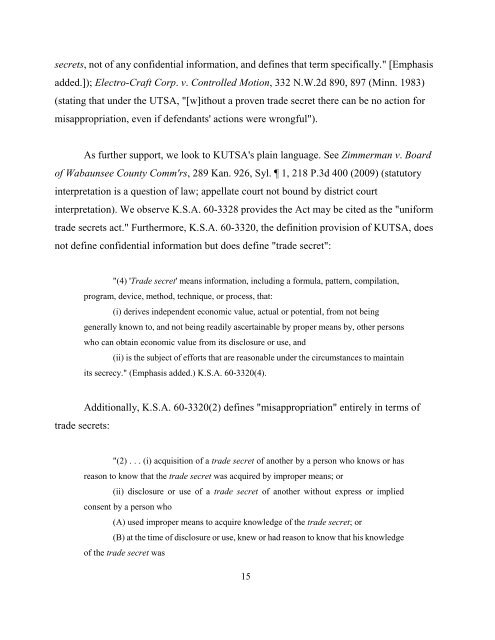Kansas Supreme Court - 99536 â Wolfe Electric, Inc. v. Duckworth
Kansas Supreme Court - 99536 â Wolfe Electric, Inc. v. Duckworth
Kansas Supreme Court - 99536 â Wolfe Electric, Inc. v. Duckworth
Create successful ePaper yourself
Turn your PDF publications into a flip-book with our unique Google optimized e-Paper software.
secrets, not of any confidential information, and defines that term specifically." [Emphasis<br />
added.]); Electro-Craft Corp. v. Controlled Motion, 332 N.W.2d 890, 897 (Minn. 1983)<br />
(stating that under the UTSA, "[w]ithout a proven trade secret there can be no action for<br />
misappropriation, even if defendants' actions were wrongful").<br />
As further support, we look to KUTSA's plain language. See Zimmerman v. Board<br />
of Wabaunsee County Comm'rs, 289 Kan. 926, Syl. 1, 218 P.3d 400 (2009) (statutory<br />
interpretation is a question of law; appellate court not bound by district court<br />
interpretation). We observe K.S.A. 60-3328 provides the Act may be cited as the "uniform<br />
trade secrets act." Furthermore, K.S.A. 60-3320, the definition provision of KUTSA, does<br />
not define confidential information but does define "trade secret":<br />
"(4) 'Trade secret' means information, including a formula, pattern, compilation,<br />
program, device, method, technique, or process, that:<br />
(i) derives independent economic value, actual or potential, from not being<br />
generally known to, and not being readily ascertainable by proper means by, other persons<br />
who can obtain economic value from its disclosure or use, and<br />
(ii) is the subject of efforts that are reasonable under the circumstances to maintain<br />
its secrecy." (Emphasis added.) K.S.A. 60-3320(4).<br />
trade secrets:<br />
Additionally, K.S.A. 60-3320(2) defines "misappropriation" entirely in terms of<br />
"(2) . . . (i) acquisition of a trade secret of another by a person who knows or has<br />
reason to know that the trade secret was acquired by improper means; or<br />
(ii) disclosure or use of a trade secret of another without express or implied<br />
consent by a person who<br />
(A) used improper means to acquire knowledge of the trade secret; or<br />
(B) at the time of disclosure or use, knew or had reason to know that his knowledge<br />
of the trade secret was<br />
15
















